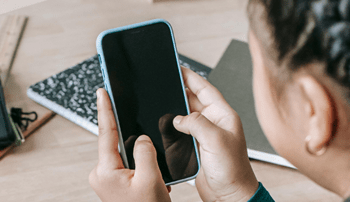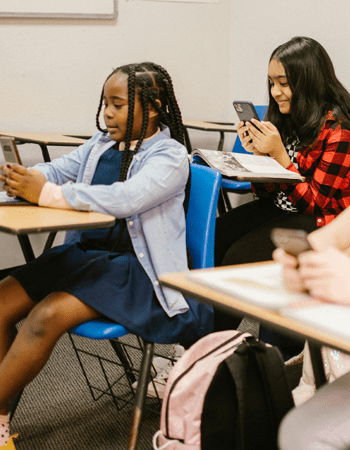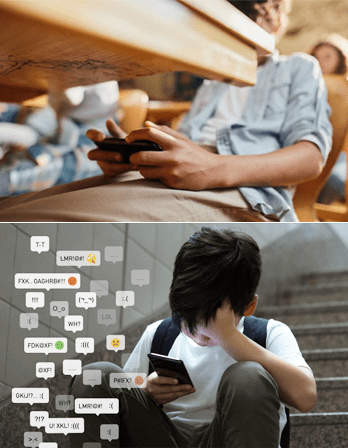Register
Worth Ave. Group - Providing peace of mind to consumers for over 50 years.
Why States Are Cracking Down on Phone Use in Schools
Posted:
August 28, 2024
Categories:
General


Students' smartphone use in class has long been a massive headache for educators. What started as a way for students to stay in touch with their parents became a significant distraction in the classroom. Teachers have dealt with texting during class, scrolling social media, watching videos, or playing games under desks, and students who are more focused on phone screens than lessons. This ongoing struggle to maintain students' attention and reduce learning distractions has led to an increasing number of states imposing strict bans on phone use in schools.

Why are states banning phones in schools?
The main reason for banning smartphones in schools is the growing concern about the distractions these devices pose in the classroom, negatively impacting student focus and academic performance. According to a Pew Research Center survey released in April 2024, 72% of high school teachers and 33% of middle school teachers say cell phone distraction is a major problem in their classrooms.
"Many schools and districts have tried to address this challenge by implementing cell phone policies, such as requiring students to turn off their phones during class or give them to administrators during the school day. However, 30% of teachers whose schools or districts have cell phone policies say they are very or somewhat difficult to enforce", says the same survey.
A Common Sense Media study found that 97% of students use their phones during the school day and receive about 237 notifications, with around a quarter of them during school hours.
"Although messaging and browser app categories were most frequently used during school hours, this averaged only a few minutes, while social media (32% of smartphone usage during school hours), YouTube (26%), and mobile games (17%) took up the largest proportion of time during school hours, among participants who used those types of apps", reports Common Sense Media.
According to UNESCO, even just having a cell phone nearby with notifications coming through is enough to distract students and pull their attention away from lessons. "One study found that it can take students up to 20 minutes to refocus on what they were learning once distracted," says UNESCO, pointing out that only technology that clearly supports learning should be allowed in schools.
But the argument isn't just about distraction. Excessive smartphone use has also been linked to several mental health issues among kids and teens, including depression, anxiety, low self-esteem, and low psychological well-being. The constant presence of cell phones is also considered to reduce face-to-face interactions, increase cyberbullying, and facilitate cheating during tests and assignments.
These are the issues that states seek to address by banning or restricting cell phone use in schools. The goal is to create a better environment where students are more present in the moment, both academically and socially, and less susceptible to the negative effects of uncontrolled phone use.

Which states are banning phones in schools?
A growing number of states have implemented or proposed laws banning or restricting the use of cell phones in schools. Florida was the first state to pass such a law in 2023, requiring public schools to prohibit using cell phones and other wireless devices during instructional time and block access to social media on school Wi-Fi networks. Several other states, including Indiana, Ohio, Minnesota, South Carolina, and Louisiana, followed suit in 2024 with their own legislation. Many other states are getting closer to cell phone bans in schools statewide or are considering this option.
Virginia Governor Glenn Youngkin issued an executive order to establish "cell phone - free education" in public schools across the state. California Governor Gavin Newsom sent a letter to all school districts throughout the state urging them to restrict smartphone use in classrooms, adding that he is working with the California Legislature to further limit student smartphone use in schools. New York Governor Kathy Hochul plans to propose a statewide policy to tackle excessive smartphone use in schools.
How are schools enforcing phone bans?
Many schools have adopted strict no-phone policies and now require students to turn off their phones and place them in their lockers or designated containers at the beginning of the school day. In some schools, students must seal their phones in special lockable pouches and can only unlock them at the end of the school day. However, enforcing these policies is not without challenges. While most students comply, some find creative ways to sneak them into class.

What do teachers think about the phone bans?
Teachers largely support the phone bans as they have seen firsthand the damaging impact of cell phones on classroom engagement and learning. They have warned about the problem for years and shared their frustrations about the difficulties in managing phone use under previous, less stringent policies.
Many teachers in schools where a phone ban has been implemented have noted a positive shift in the classroom environment. They say that without phones nearby, students are not tempted to check social media or text during lessons, so they are more focused, participate more actively in class, and interact more with their peers.
How do parents feel about the phone bans?
While most teachers agree that cell phones don't belong in the classroom, parents who used to have constant access to their children during the school day are mainly against outright phone bans.
A National Parents Union survey from February 2024 found that although many parents support some form of restriction, especially during class times, 56% think students should be allowed to use their cell phones in school sometimes, like during lunch or recess. Parents also express significant concern about being unable to reach their children in case of emergencies, though schools assure that they can always do this through the school office.
As more states are expected to follow this trend in 2024 and 2025, the conversation is slowly shifting from whether to ban phones in schools to how to implement these policies effectively. It's clear that while phone bans aim to improve student focus, academic performance, socializing, and mental health, their success hinges on thoughtful execution and support from all parties involved.

If you’re a parent interested in protecting your kid’s phone, tablet, or laptop, check out our device insurance solutions and get a free quote!
If you’re a K-12 school administrator looking to protect your school-issued Chromebooks and iPads, explore our K-12 School Device Insurance and get a free quote!















